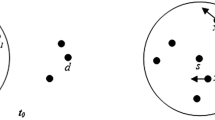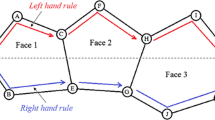Abstract
Geographic routing for realistic conditions is often permeated with localization errors resulting in poor performance and high energy consumption. We propose a simple yet novel geographic routing method to accomplish routing in the presence of location and channel errors. In this algorithm, it is proposed that next hop node is selected based on the combined probability of distance, estimated location error and estimated channel access probability associated with neighbor nodes. The metrics observed for performance were the successful packet delivery rate and the energy consumed. Our algorithms performance is better compared to greedy forwarding techniques of algorithms such as Greedy routing scheme (GRS) and geographic random forwarding (GeRaF). Simulations show the throughput for our algorithm is better compared to others along with reducing the energy wasted on lost packets.










Similar content being viewed by others
References
Kuhn, F., Wattenhofer, R., & Zollinger, A. (2003). Worst-case optimal and average-case efficient geometric ad-hoc routing. In Proceedings of the 4th ACM international symposium on mobile ad hoc networking and computing—MobiHoc ’03 (p. 267).
Mauve, M., Widmer, J., & Hartenstein, H. (2001). A survey on position-based routing in mobile ad hoc networks. IEEE Network, 15(6), 30–39.
Misra, P., Burke, B. P., & Pratt, M. M. (1999). GPS performance in navigation. Proceedings of the IEEE, 87(1), 65–85.
Hightower, J., & Borriello, G. (2001). Location systems for ubiquitous computing”. Computer, 34(8), 57–66.
Kim, Y., Lee, J.-J., & Helmy, A. (2003). Impact of location inconsistencies on geographic routing in wireless networks. In Proceedings of the 6th international workshop on modeling analysis and simulation of wireless and mobile systems—MSWIM ’03 (p. 124).
Misra, P., & Enge, P. Global positioning system: signals, measurements and performance Second Edition Part #2500–2 introduction a brief history of navigation methods of radionavigation radionavigation systems.
Bahl, P., & Padmanabhan, V. N. (2000).RADAR: an in-building RF-based user location and tracking system. In Proceedings IEEE INFOCOM 2000. Conference on computer communications. Nineteenth annual joint conference of the IEEE computer and communications societies (Cat. No.00CH37064) (vol. 2, pp. 775–784).
Karp, B. N. (2000) Geographic routing for wireless networks. Ph.D thesis, Harvard University.
Finn, G. G. (1987). Routing and addressing problems in large metropolitan-scale internetworks. ISI Research Report.
Kong, Y., Kwon, Y., Shin, J., & Park, G. (2011). Localization and dynamic link detection for geographic routing in non-line-of-sight (NLOS) environments. EURASIP Journal on Wireless Communications and Networking, 11(1), 52.
Kwon, S., & Shroff, N. B. (2006). Geographic routing in the presence of location errors. Computer Networks, 50(15), 2902–2917.
Frey, H., Li, X., & Ruehrup, S. (2011). Ad-hoc, mobile, and wireless networks : 10th international conference, ADHOC-NOW 2011, Paderborn, Germany, July 18–20, 2011 : Proceedings. Springer.
Takagi, H., & Kleinrock, L. (1984). Optimal transmission ranges for randomly distributed packet radio terminals. IEEE Transactions on communications, 32(3), 246–257.
Peng, B., & Kemp, A. H. (2011). Energy-efficient geographic routing in the presence of localization errors. Computer Networks, 55(3), 856–872.
Wan, J., Yu, N., Feng, R., Wu, Y., & Su, C. (2009). Localization refinement for wireless sensor networks. Computer Communications, 32(13), 1515–1524.
Papoulis, A., & Pillai, S. U. (2002). Probability, random variables, and stochastic processes. New York: Tata McGraw-Hill.
He, T., Huang, C., Blum, B. M., Stankovic, J. A., & Abdelzaher, T. (2003). Range-free localization schemes for large scale sensor networks. In Proceedings of the 9th annual international conference on mobile computing and networking—MobiCom ’03 (p. 81).
Kadi, M., & Alkhayat, I. (2015). The effect of location errors on location based routing protocols in wireless sensor networks. Egyptian Informatics Journal, 16(1), 113–119.
Hossein Manshaei, M., & Hubaux, J.-P. (2010) Performance analysis of the IEEE 802.11 Distributed coordination function: Bianchi model.
Mhemed, R., Aslam, N., Phillips, W., & Comeau, F. (2012). An energy efficient fuzzy logic cluster formation protocol in wireless sensor networks. Procedia Computer Science, 10, 255–262.
Zorzi, M., & Rao, R. R. (2003). Geographic random forwarding (geraf) for ad hoc and sensor networks: Multihop performance. IEEE Transactions on Mobile Computing, 2(4), 337–348.
Acknowledgement
This research was supported by Jawaharlal Nehru University through a grant from the Department of Science and Technology, Government of India for Promotion of University Research and Scientific Excellence. We thank Prof. P.C. Saxena Prof. Emeritus from Jawaharlal Nehru University who provided insight and expertise that greatly assisted the research.
Author information
Authors and Affiliations
Corresponding author
Additional information
Publisher's Note
Springer Nature remains neutral with regard to jurisdictional claims in published maps and institutional affiliations.
Rights and permissions
About this article
Cite this article
Katti, A., Lobiyal, D.K. Energy Efficient Location Error Resilient Connectivity in Wireless Sensor Networks. Wireless Pers Commun 116, 723–737 (2021). https://doi.org/10.1007/s11277-020-07735-y
Published:
Issue Date:
DOI: https://doi.org/10.1007/s11277-020-07735-y




